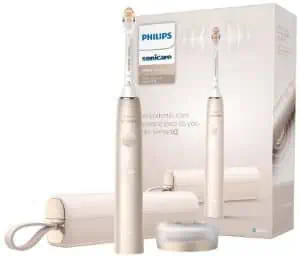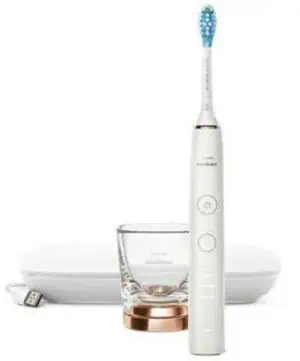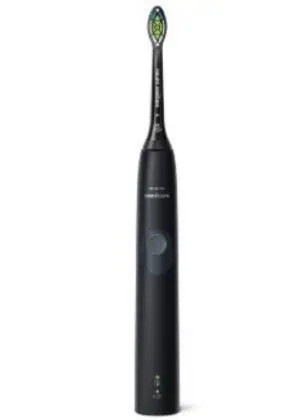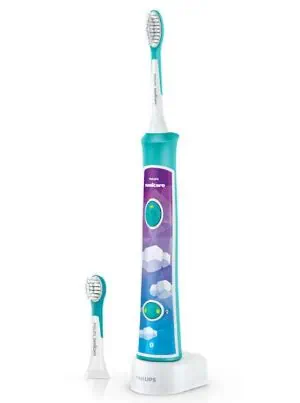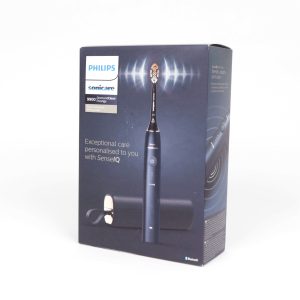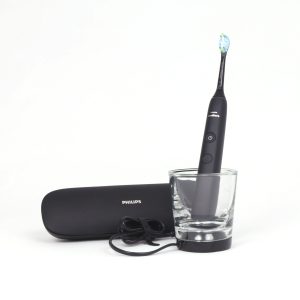Oral-B and Philips Sonicare are the two most popular and longest-running electric toothbrush brands, so it’s only natural to ask: Which is best?
The Philips Sonicare vs. Oral-B debate can be broken down into a few simple questions:
- Which is better for removing plaque?
- What other differences should I consider?
- What options does each brand offer?
- How to get the most for your money – whatever your budget!
Without further ado, let’s start the debate!
| ||
| ||
| ||
| ||
Oral-B or Sonicare: Best options for your budget
Both Sonicare and Oral-B offer high-quality electric toothbrushes. We have created the table below to provide you with some of the best electric brush options for every budget. To read more about each electric toothbrush, feel free to click on the links in the table.
Sonicare | Oral-B | |
Top-Tier | ||
High mid-range | ||
Low mid-range | ||
Budget |
After considering multiple factors – such as plaque removal, brush head options, charging, user-friendliness and overall value for money – we have decided which option wins as the overall best electric toothbrush.
Introducing …
The overall best electric toothbrush: Sonicare 9900 Prestige
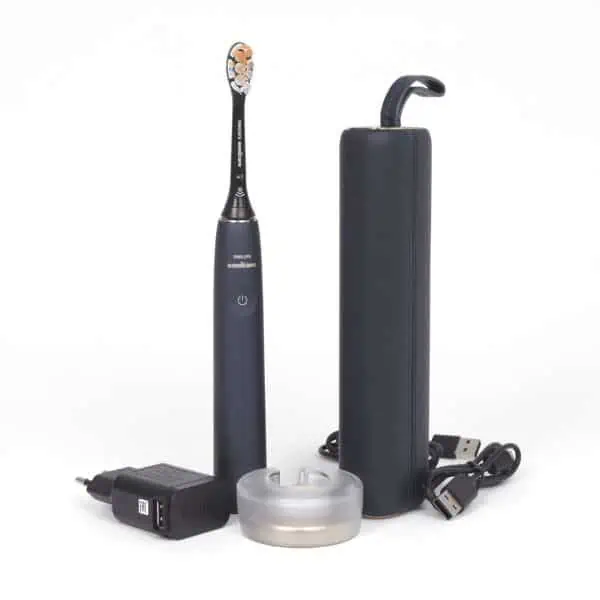
Philips Sonicare vs Oral-B: The difference is in the brush head

The most noticeable difference between Sonicare and Oral-B is the type of brush head. Since the brush head is the part that makes contact with your teeth, it makes sense to start the comparison there. We’re not only taking into account the shape of the brush, but also how they move.
Sonicare brush heads: How do they work?
Sonicare toothbrushes have a traditional brush shape. All brush heads are elongated and slightly smaller than that of a standard manual brush.
Each brush head has at least two types of bristles, and there are different models for specific functions like gum care or whitening. All Sonicare brush heads share the feature that the bristles are positioned perpendicular to the head.
The motion of a Sonicare toothbrush is known as ‘sonic vibration’ created by a high-powered motor in the handle. This motor emits a frequency that causes the bristles of the brush to move from side to side about 31,000 times per minute.
The high-frequency sonic vibrations intend to loosen plaque and tartar from your teeth. This is done through direct contact and some principles of fluid dynamics. It’s been proven to remove anywhere from 3-10 times more plaque than a manual brush.
For more information, you can check out some Sonicare toothbrush reviews here. To see a visualisation of how one of the top Sonicare electric toothbrushes works, feel free to watch the video below!
Oral-B brush heads: How do they work?
Oral-B and Philips Sonicare share some resemblances in their brush heads. Both brands have slightly smaller brush heads than manual toothbrushes and offer a range of bristle patterns for diverse purposes.
However, Oral-B heads distinguish themselves by featuring bristles sometimes placed at angles, a design choice to enhance access to the smaller areas between teeth.
The two brands have clear differences in the shape and movement of brush heads. Oral-B heads are uniquely round, setting them apart from other toothbrushes. They also operate in a spinning motion, compared to Sonicare’s sonic vibrations. While the speed may vary across models, Oral-B’s top-tier brushes are noted for their impressive 8,800 oscillations per minute.
3D vs 2D cleaning action
Oral-B refers to its brush head oscillations as ‘2D cleaning action’. Many of their new electric brushes currently employ ‘3D cleaning action’ which combines the rotation of the head with a back-and-forth pulsing motion. Although this is quite the same as sonic vibration, it functions similarly with the same fluid-dynamics-based indirect cleaning.
The video below demonstrates the Oral-B 3D action in their latest line of electric toothbrushes.
Oral-B vs Sonicare: Plaque removal
Numerous studies have focused on the plaque removal efficiency of Oral-B vs Sonicare toothbrushes. After reviewing these studies, we can conclude that Oral-B might have a slight advantage thanks to its oscillating brush head motion.
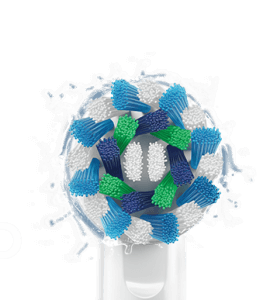
To give you a better idea of what researchers are saying about this debate, we’ve put together a few excerpts from several of these studies:
Research results
A study by the Northwestern University Dental School compared the long-term results of Sonicare and Oral-B brushes. They found that while both brushes helped improve subjects’ oral hygiene, Sonicare had a clear long-term advantage over Oral-B:
“Overall, this study demonstrates that long-term use of these two electric toothbrushes improves periodontal health in adult periodontitis patients, and that the Sonicare brush is superior to the Braun brush in reducing gingival inflammation and probing depth. Moreover, 6 months’ use of Sonicare led to actual improvement in probing attachment levels of periodontal pockets.”
-Robinson, Madalozzo, and Breslin
Meanwhile, a study from the International Dental Journal compared the brush head motion between Sonicare and Oral-B for plaque removal. They concluded that Oral-B’s rotational toothbrush head motion was more effective than Sonicare’s sonic vibration:
“Based on the findings of this single-use clinical evaluation, the action of the oscillating/pulsating power toothbrush is more effective at plaque removal than a high-frequency power toothbrush.”
-Strate et al.
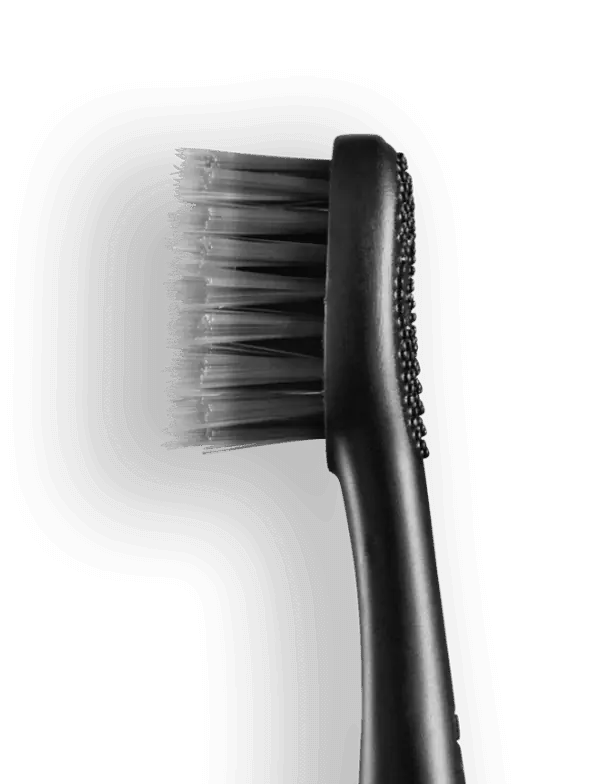
A recent study by the University of Amsterdam and Vrije Universiteit Amsterdam also concluded that electric toothbrushes with an oscillating head motion (like Oral-B toothbrushes) have a small advantage over high-frequency sonic toothbrushes like Sonicare’s toothbrushes.
“There is moderate certainty for a very small benefit for the use of a powered toothbrush with an OR over an HFS mode of action.”
-Thomassen, Van der Weijden and Slot
What does all of this mean?
In the search to determine the better choice between Oral-B and Sonicare for plaque removal, science has yet to provide a definitive answer. It’s important to note that the studies conducted have involved various models from each brand, potentially introducing other variables that could affect the outcomes.
Our comparison specifically contrasts the oscillating/pulsating motion of Oral-B brushes with the sonic vibrations offered by Sonicare. Taking this into consideration, Oral-B has proven itself the slightly better option for plaque removal.
Does this mean there’s no significant difference in their cleaning efficiency? Not necessarily. Beyond the direct comparison of plaque removal capabilities, there are several other factors to consider.
Other factors to help decide if Sonicare or Oral-B is better
There are several other factors to consider when deciding which electric toothbrush to buy. Let’s have a quick look at those factors that give one brush an edge over the other:
Aesthetics
The majority of people think that Sonicare has the aesthetic advantage of being a sleeker, better-looking toothbrush. It has a modern design with better colour coordination between the brush heads and handles. Unfortunately, the Oral-B designs are slightly lacking aesthetics, except for their new iO range.
If you’re looking for an aesthetically pleasing brush, Sonicare is your best bet.
Noise
Both the Orab-B and Philips Sonicare electric brushes make noise when used. Despite this, Sonicare has been reviewed as the quieter brush between the two brands. In some reviews, Oral-B’s motor has been criticized for being so loud you may need to close your door while brushing – with the iO being an exception again.
Warranty
Both brands offer a two-year warranty on their products. However, Oral-B offers a full additional year for free if you register on their website, a feature definitely worth considering when shopping for high-end models.
Price range
Both Sonicare and Oral-B offer electric toothbrushes for various budget ranges, as previously discussed here. Once you have decided on your preferred budget range, you may find that one brand has more features than the other for the same price. We recommend doing the appropriate research before purchasing.
Cost of replacing the brush head
Oral-B replacement brush heads are generally slightly less expensive than Sonicare. Note that higher-end models from both brands tend to have more expensive smart brush heads as well.
Some factors favour one brand, while others favour the other, making it challenging to determine a clear winner. It can be helpful to prioritise your needs to decide which brush will best suit you.
Sonicare vs. Oral-B: Models offered over different price ranges
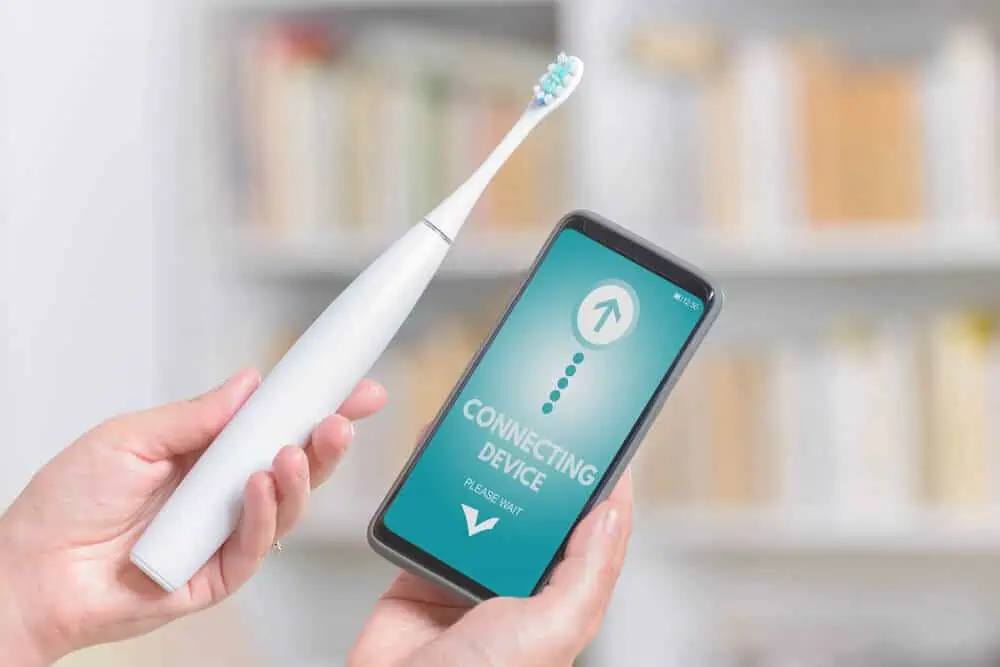
We can compare Sonicare and Orab-B at different price points, as well as see what features become available as you move between price ranges.
A few features that all of these brushes share include:
- Rechargeable battery with charging stand
- 2-minute brush timer with 30-second intervals
- Replaceable and interchangeable brush heads
- 2-year warranty
With this in mind, let’s take a look at some of the different electric brushes offered by the two brands.
Philips Sonicare vs Oral-B: The top-tier range
We’ll start by comparing the top-tier options of both brands: Sonicare 9900 Prestige vs Oral-B’s iO Series 9. Both offer the latest in features and connectivity from each brand.
Despite the high price, both promise an unprecedented level of personalised cleaning. So, how do they compare?
Sonicare 9900 Prestige with SensIQ
The Sonicare 9900 Prestige with SensIQ technology is the most advanced Sonicare toothbrush on the market, designed to remove 20x more plaque than a manual toothbrush.
This powerful brush has all of the amazing components that set Sonicare brushes apart when it comes to better, safer, and more stylish tooth cleaning. Additionally, the brush also works with SensIQ technology.
Some of the highlights of SenseIQ are:
- Pressure sensor: Lets you know when you are brushing too hard
- Position sensor: Lets you know where you are brushing for each brushing session
- Scrubbing sensor: Lets you know when you should reduce scrubbing, which is harmful to enamel
- 3D mouth map: This highlights areas you are missing when brushing
- Adaptive intensity: A feature that automatically adjusts the intensity level while you brush
- Artificial intelligence: Detects and syncs your brushing methods and preferences
Other unique and innovative features of this toothbrush include:
- Technical specifications:
- Connectivity: Bluetooth wireless technology with app
- Power: 110-220V power supply
- Battery: Rechargeable lithium ION battery that lasts 2+ weeks
- Warranty: 2-year limited warranty
- Compatibility: Android OS 8.0 or above and iPhone iOS 13.0 or above
2. Look and ease of use:
- Battery indicator: Illuminated icon
- Handle: Sleek and compact
- Operation: Touch control
- Travel case: Vegan leather compact charging case
- Brush head replacement: Icon lights up
3. Cleaning performance:
- Efficiency: Removes up to 20x more plaque
- Gum health: Up to 15x healthier gums
- Speed: 62,000 brush movements/minute
- Timer: Quad timer and 2-minute timer
- Whitening: 100% fewer stains
- Pressure sensor: The handle vibrates and ring lights up purple
- Scrubbing sensor: Handle vibrates and ring lights up amber
4. Three intensity modes and five customisable modes, namely:
- Clean
- White+
- Gum health
- Deep clean
- Sensitive
The brush head is an A3 Premium All-in-One brush head with angled bristles that have triangular tips and longer bristles to reach further. It also charges standing on a frosted glass charging base. If you’re interested in purchasing this top-tier brush, just click on the link below!
Oral-B iO Series 10
Oral-B’s latest innovation, the iO Series 10 comes with lots of cutting-edge features. Featuring a refined design with smoother contours and a light-up display screen, the brush heads are available in black or white.
The iO Series 10 comes with a convenient magnetic charging base. The Sense Smart Charger not only efficiently charges the iO1 in just three hours, but also offers live coaching and personalised guidance tailored to enhance your cleaning routine.
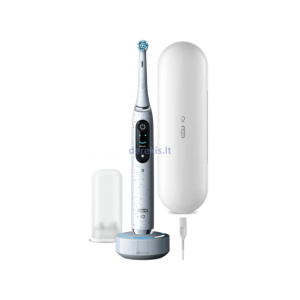
The new iO range replaces the previous Oral-B drive system with a linear magnetic motor, creating a much more powerful brush. Also noteworthy is the fact that it runs significantly quieter than other Oral-B models, though still slightly louder than sonic toothbrushes.
The iO Series 10 boasts seven different cleaning modes, namely:
- Daily clean
- Whitening
- Gum care
- Sensitive
- Intense
- Super sensitive
- Tongue clean
Unfortunately, it doesn’t have a setting for adjusting the intensity. The battery life lasts around two weeks after one full charging session.
Like its counterpart from Sonicare, this brush has a pressure sensor. However, the iO series’ pressure sensor offers a slight bonus. It won’t just tell you when you’re brushing too hard, but will automatically slow down oscillation if you apply too much pressure. It also indicates when you are using the correct pressure with a green light. This feature is meant to optimise each mode’s performance.
The app has a real-time interface that will display your progress as you brush. It will also highlight areas that need more attention or that tend to receive too much pressure. After brushing it will also provide you with coaching and even a score. You can work toward increasing that score—a nice incentive to improve your routine.
The iO Series 10 includes:
- Brush handle with a light-up display
- Magnetic charging base
- 4 brush heads (one type)
- Charging travel case
All in all, it is very comparable with the DiamondClean Smart with a few key differences. Essentially, the iO Series 10 has a more advanced display but doesn’t offer the same variety in brush heads. The app interface and functionality may be another factor in helping you decide which brush is best for you.
Philips Sonicare vs. Oral-B: High mid-range
Now that we’ve seen the best in what Sonicare and Oral-B have to offer, let’s check out some more of the wide range of standard models.
First, we’ll look at the slightly more expensive mid-range brushes, which are available at around £150: Oral-B’s Genius X vs. the Sonicare DiamondClean 9000. These brushes are more straightforward in their design, though they do incorporate some of the more advanced features available.
Philips Sonicare DiamondClean 9000
The Philips Sonicare DiamondClean 9000 is a premium toothbrush option, but has slightly fewer features than the DiamondClean Smart and is less expensive. It is available in 2 colours, pink or black, with hidden LED controls.
The DiamondClean 9000 offers only 4 cleaning modes, unlike the DiamondClean Smart, which has 5 (including the tongue care option). Both models have 3 intensity settings that can be used with each cleaning mode.
Other similarities to the Smart version include:
- BrushSync mode-pairing
- BrushSync replacement reminder
- Pressure sensor
- Charging travel case
- 14-day battery life after 24 hours of charging
The main difference between the 9000 and the Smart model is that the DiamondClean 9000 cannot connect to the Philips Sonicare app. If you are not too interested in the app, the models prove to be very similar otherwise.
A Philips Sonicare DiamondClean 9000 includes:
- DiamondClean handle
- Premium plaque defence brush head
- Puck charger
- Charging travel case
If you’re interested in purchasing the Sonicare DiamondClean 9000, click on our link below to get started!
Oral-B Genius X
The Oral-B Genius X is available in three sleek colours: Black, rose quartz and rose gold. It has a battery life of twelve days (same as the iO Series) but without the quick charge feature.

It offers six different brushing modes, namely:
- Daily clean
- Pro-clean
- Whitening
- Gum care
- Sensitive
- Tongue cleaning
In comparison to the iO series, it is only missing the intense mode.
The Genius X model offers a pressure sensor to alert you when you’re brushing too hard. Like the iO series, it will automatically decrease the oscillation speed when necessary, but it will not indicate when you are brushing at just the right pressure.
The pressure sensor on the Genius X is visible in the form of a Smart Ring, unlike its Sonicare rival which doesn’t have a visible pressure sensor. The Smart Ring is a colourful ring at the top of the brush that you can customise via the Oral-B app.
With the app, real-time feedback and coaching aren’t reserved for only the top-of-the-line models. Despite the more basic interface, it performs a lot like an iO, only with slightly fewer goodies.
When it comes to Oral-B vs Sonicare, this model wins regarding colour options, app connectivity and the visual SmartRing technology. However, the Oral-B Genius X doesn’t include the 3 intensity settings, mode-pairing, and the brush head replacement reminder.
A Genius X kit includes:
- Brush handle
- Brush head
- Charging station with 2 pin plug
- USB Charging Travel case
- SmartRing Feature
Philips Sonicare vs. Oral-B: Low mid-range
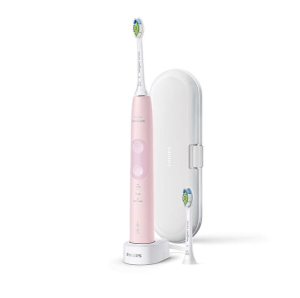
Next, we’ll look at some less expensive mid-range brushes that Oral-B or Sonicare have to offer, at around £100 each: Oral-B SmartSeries 6500 vs. Sonicare ProtectiveClean 5100.
The Sonicare ProtectiveClean 5100
The ProtectiveClean 5100 comes in three different colour schemes, though replacement heads still only come in black and white.
It offers three brushing modes, two less than the DiamondClean, and only one intensity mode. There is however a pressure sensor, though it will only alert you with a pulsing sound and not a visual cue.
This toothbrush, unfortunately, does not have the app support that is available for the DiamondClean series. However, the BrushSync smart head does offer some features like recognising which head is attached, automatically adjusting the brushing mode and reminders to replace your brush head.
Although many of its features are more simplistic than Sonicare’s top electric brushes, the basics remain the same. The ProtectiveClean 5100 has a sleek design, a two-week battery life, and multiple brushing modes.
A Sonicare ProtectiveClean 5100 comes with:
- Brush handle
- 2 DiamondClean brush heads
- Charging stand
- Travel case
Oral-B SmartSeries 6500
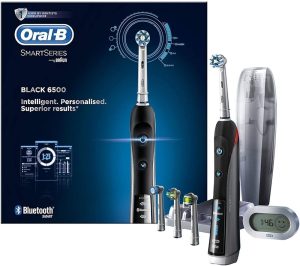
The Oral-B SmartSeries 6500 was designed to improve your dental routine and offers multiple tools to encourage better brushing habits. Its most noticeable feature is the fact that it has 6 brushing modes – more than any other of its mid-range rivals.
Its wireless SmartGuide timer lets you know when you have brushed for the recommended amount of time and in the right places, while the pressure sensor stops you from brushing too hard and causing any damage to your tooth enamel or gums.
The SmartSeries 6500 also has different brush heads, and as mentioned before, 6 different brushing modes to use with them.
Similar to many of the mid-range models, the Oral-B SmartSeries 6500 comes with Bluetooth connectivity to support the Oral-B app, while its Sonicare mid-range rival does not include app connectivity.
An Oral-B SmartSeries 6500 kit includes:
- Brush handle
- 4 brush heads
- Travel case
- UK two-pin plug
Philips Sonicare vs Oral-B: Budget options
Finally, we are going to look at some of the more affordable models that are on the market. Although both brands do sell cheaper and simpler options than these, we are going to compare the Sonicare Philips One vs. the Oral-B Pro 2 2500.
Sonicare Philips One
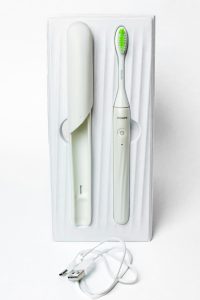
The new Philips One electric brush makes it easy and affordable to have a brighter smile whenever and wherever.
It’s a no-frills brush with a sleek and minimalist design. With 13,000 micro-vibrations per minute and contoured bristles, brushing your teeth reveals a whiter and cleaner smile – while a lightweight travel case allows for convenient storage in your everyday bag.
It offers a 2-minute timer that lets you know how long to brush, and a buzz every 30 seconds to let you know when to switch quadrants.
The most affordable version is just £29.99 and has an AAA battery that lasts for a whole 90 days, so you can change your battery when you change your brush head — which also comes in various colours, including Miami orange, mango yellow, midnight and mint blue.
If you prefer a rechargeable brush, you can pay slightly more (£39.99) for the Philips One rechargeable which has a USB charger and lasts 30 days on a single charge.
Oral-B Pro 2 2500
The Oral-B’s Pro 2 2500 offers two brushing modes, daily clean and gum care, unlike its Sonicare rival which only offers one. There is a pressure sensor that simply slows or stops its oscillation when you are pressing too hard. It also comes with a standard travel case, which many other budget electric toothbrushes don’t come with.
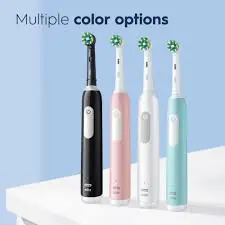
colour options, including pink!
Its battery lasts about seven days between charges and unfortunately doesn’t offer a built-in head replacement reminder.
When it comes to Sonicare vs. Oral-B in the budget range, Sonicare has the advantage of long-lasting battery life and a brush head replacement reminder. However, Oral-B has a more modern pressure sensor that slows or stops oscillation when you are brushing too hard.
An Oral-B Pro 2 2500 includes:
- Brush handle
- Cross-action toothbrush head
- Charger with 2-pin UK plug
- Li-ion battery
- Standard travel case
In order to make things easier for you, we have compiled a quick comparison table for the electric toothbrush models we discussed:
Toothbrush | Tier | Battery Life | Number of Modes | App & Replacement Reminders | Price |
Sonicare 9900 Prestige | Top tier | 14 days / 24-hour charge | 5 modes w/ 3 intensities | App connectivity & replacement reminder | |
Oral-B iO Series 9 | Top tier | 14 days / 3-hour charge | 7 modes | App connectivity | |
Sonicare DiamondClean 9000 | High mid-range | 14 days / 24-hour charge | 4 modes | No | |
Oral-B Genius X | High mid-range | 12 days / 22-hour charge | 6 modes | App connectivity | |
Sonicare ProtectiveClean 6100 | Low mid-range | 14 days / 24-hour charge | 3 modes w/ 3 intensities | Head recognition & replacement reminder | |
Oral-B SmartSeries 6500 | Low mid-range | 12 days / 22-hour charge | 6 modes | App connectivity & replacement reminder | |
Philips One | Budget | 30 days / 90 days battery life | 1 mode | Replacement reminder | |
Oral-B Pro 2 2500 | Budget | 7 days / 22-hour charge | 1 mode | None |
Conclusion
Which is better: Oral-B or Sonicare? When it comes to electric toothbrushes, both Oral-B and Sonicare have their pros and cons at all price ranges.
However, studies have shown that both brands are more effective than a manual brush. When considering Sonicare vs. Oral-B, it’s important to consider which features and characteristics are most important to you.
If you prefer oscillating and pulsating motion, then Oral-B’s 3D cleaning action may be the better choice for you. Oral-B’s mid-range and budget options also offer more features than Sonicare, regardless of the lower price point.
If you’re looking for a quieter motor and modern design, then Sonicare could be the way to go. Philips Sonicare offers a wide range of advanced electric toothbrushes with features like multiple brushing modes, advanced sensors, and premium materials, making it a strong contender in the market.
Ultimately, maintaining a regular brushing and flossing schedule is the most important thing for your oral hygiene, regardless of which type of toothbrush you choose. However, with its advanced technology and impressive features, Philips Sonicare is a brand worth considering when it comes to electric toothbrushes.
FAQs
Which is the best electric toothbrush?
After considering multiple factors – such as plaque removal, brush head options, charging, user-friendliness and overall value for money – the overall best electric toothbrush has proven to be the Philips Sonicare 9900 Prestige.
Are electric toothbrushes better than manual ones?
In short, yes. Recent studies have shown that electric toothbrushes remove plaque more effectively, ultimately improving oral health and reducing the risks of infection. This is due to the improved ability to clean hard-to-reach areas and also the fact that electric brushes now have features that encourage users to maintain better dental habits.
Which removes plaque better, Oral-B or Sonicare?
When comparing specifically the oscillating/pulsating motion of Oral-B brushes with the sonic vibrations offered by Sonicare, Oral-B has proven itself the slightly better option for plaque removal. Beyond the direct comparison of plaque removal capabilities, there are several other factors to consider.
Are all Oral-B brush heads interchangeable?
Standard Oral-B brush heads come in a few styles that serve different purposes like gum care or whitening. These can be interchanged among Oral-B brushes except for the iO series. In the latest series from Oral-B, iO brushes have specialised heads that cannot be attached to other models outside the iO line.
How often should I replace my electric toothbrush head?
The general recommendation is to replace your toothbrush head every three months. Luckily, many Oral-B or Sonicare toothbrushes can alert you when it is time to replace the head.
National Center for Biotechnology Information: A comparison of the efficacy of powered and manual toothbrushes in controlling plaque and gingivitis: A clinical study. [1] Consulted September 16, 2020
National Center for Biotechnology Information: A six-month clinical comparison of the efficacy of the Sonicare and the Braun Oral-B electric toothbrushes on improving periodontal health in adult periodontitis patients. Consulted 16th September 2020
ResearchGate: A comparison of the plaque removal efficacy of two power toothbrushes: Oral‐B Professional Care Series versus Sonicare Elite. Consulted September 16, 2020
ResearchGate: A randomized, crossover-design study to investigate the plaque removal efficacy of two power toothbrushes: Philips Sonicare FlexCare and Oral-B Triumph. Consulted September 16, 2020
National Center for Biotechnology Information: A comparative clinical investigation of the safety and efficacy of an oscillating/rotating electric toothbrush and a sonic toothbrush. Consulted September 16, 2020
International Journal of Dental Hygiene: The efficacy of powered toothbrushes :-A Systematic Review and Network Meta-Analysis-. Consulted 12th December 2021.





